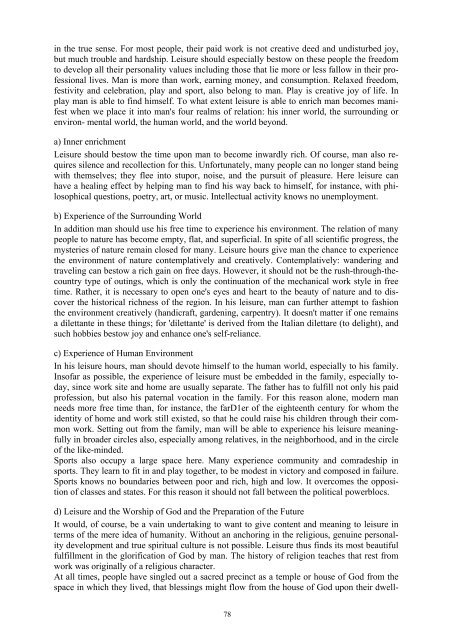Joseph Cardinal Höffner CHRISTIAN SOCIAL ... - Ordo Socialis
Joseph Cardinal Höffner CHRISTIAN SOCIAL ... - Ordo Socialis
Joseph Cardinal Höffner CHRISTIAN SOCIAL ... - Ordo Socialis
You also want an ePaper? Increase the reach of your titles
YUMPU automatically turns print PDFs into web optimized ePapers that Google loves.
in the true sense. For most people, their paid work is not creative deed and undisturbed joy,<br />
but much trouble and hardship. Leisure should especially bestow on these people the freedom<br />
to develop all their personality values including those that lie more or less fallow in their professional<br />
lives. Man is more than work, earning money, and consumption. Relaxed freedom,<br />
festivity and celebration, play and sport, also belong to man. Play is creative joy of life. In<br />
play man is able to find himself. To what extent leisure is able to enrich man becomes manifest<br />
when we place it into man's four realms of relation: his inner world, the surrounding or<br />
environ- mental world, the human world, and the world beyond.<br />
a) Inner enrichment<br />
Leisure should bestow the time upon man to become inwardly rich. Of course, man also requires<br />
silence and recollection for this. Unfortunately, many people can no longer stand being<br />
with themselves; they flee into stupor, noise, and the pursuit of pleasure. Here leisure can<br />
have a healing effect by helping man to find his way back to himself, for instance, with philosophical<br />
questions, poetry, art, or music. Intellectual activity knows no unemployment.<br />
b) Experience of the Surrounding World<br />
In addition man should use his free time to experience his environment. The relation of many<br />
people to nature has become empty, flat, and superficial. In spite of all scientific progress, the<br />
mysteries of nature remain closed for many. Leisure hours give man the chance to experience<br />
the environment of nature contemplatively and creatively. Contemplatively: wandering and<br />
traveling can bestow a rich gain on free days. However, it should not be the rush-through-thecountry<br />
type of outings, which is only the continuation of the mechanical work style in free<br />
time. Rather, it is necessary to open one's eyes and heart to the beauty of nature and to discover<br />
the historical richness of the region. In his leisure, man can further attempt to fashion<br />
the environment creatively (handicraft, gardening, carpentry). It doesn't matter if one remains<br />
a dilettante in these things; for 'dilettante' is derived from the Italian dilettare (to delight), and<br />
such hobbies bestow joy and enhance one's self-reliance.<br />
c) Experience of Human Environment<br />
In his leisure hours, man should devote himself to the human world, especially to his family.<br />
Insofar as possible, the experience of leisure must be embedded in the family, especially today,<br />
since work site and home are usually separate. The father has to fulfill not only his paid<br />
profession, but also his paternal vocation in the family. For this reason alone, modern man<br />
needs more free time than, for instance, the farD1er of the eighteenth century for whom the<br />
identity of home and work still existed, so that he could raise his children through their common<br />
work. Setting out from the family, man will be able to experience his leisure meaningfully<br />
in broader circles also, especially among relatives, in the neighborhood, and in the circle<br />
of the like-minded.<br />
Sports also occupy a large space here. Many experience community and comradeship in<br />
sports. They learn to fit in and play together, to be modest in victory and composed in failure.<br />
Sports knows no boundaries between poor and rich, high and low. It overcomes the opposition<br />
of classes and states. For this reason it should not fall between the political powerblocs.<br />
d) Leisure and the Worship of God and the Preparation of the Future<br />
It would, of course, be a vain undertaking to want to give content and meaning to leisure in<br />
terms of the mere idea of humanity. Without an anchoring in the religious, genuine personality<br />
development and true spiritual culture is not possible. Leisure thus finds its most beautiful<br />
fulfillment in the glorification of God by man. The history of religion teaches that rest from<br />
work was originally of a religious character.<br />
At all times, people have singled out a sacred precinct as a temple or house of God from the<br />
space in which they lived, that blessings might flow from the house of God upon their dwell-<br />
78















